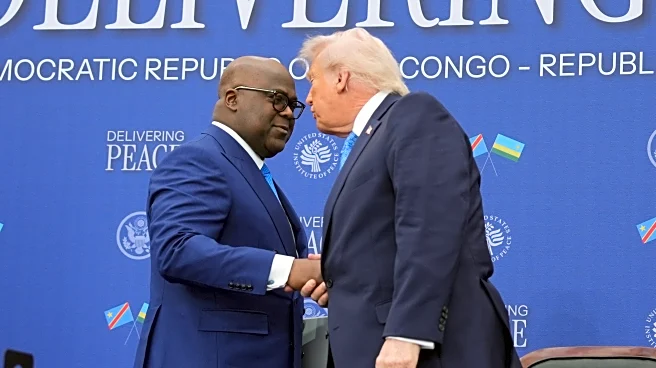What's Happening?
China's ruling Communist Party has announced a focus on accelerating self-reliance in science and technology, as part of its upcoming five-year development plan. This move comes in response to increasing
U.S. restrictions on access to semiconductors and other high-tech items. The announcement follows a four-day meeting where the party approved a draft of the plan, highlighting the need to counter external threats with domestic policy tools. The plan aims to deepen technological self-sufficiency, income redistribution, and transition to clean energy. China's industrial policy has already driven significant growth in electric cars, wind, and solar industries, and is now turning towards robotics and artificial intelligence.
Why It's Important?
The push for technological self-reliance is significant as it reflects China's strategy to mitigate the impact of U.S. trade policies, particularly tariffs imposed by President Trump. By focusing on domestic capabilities, China aims to reduce dependency on foreign technology and strengthen its position as a global tech leader. This shift could have broad implications for international trade dynamics, potentially leading to increased competition in tech innovation and manufacturing. Economically, it may bolster China's growth by enhancing domestic demand and consumption, which are crucial for sustaining economic momentum amid global uncertainties.
What's Next?
China's new five-year plan will be further detailed in March when the legislature is expected to approve it. Economists anticipate additional measures to support domestic consumption, such as subsidies for consumer loans and trade-in programs for electric vehicles. The plan's implementation will likely involve significant investments in technology and clean energy sectors, aiming to solidify China's economic foundation and achieve its growth targets. The international community will be closely monitoring these developments, especially in light of ongoing trade negotiations and geopolitical tensions.
Beyond the Headlines
The emphasis on technological self-reliance also underscores China's commitment to modernizing its military capabilities, as evidenced by recent leadership changes within the Central Military Commission. This focus on political loyalty and anti-corruption aligns with President Xi Jinping's broader agenda to strengthen China's global influence and military prowess. The long-term implications could include shifts in global power dynamics, as China seeks to assert its role as a leading technological and military power.










